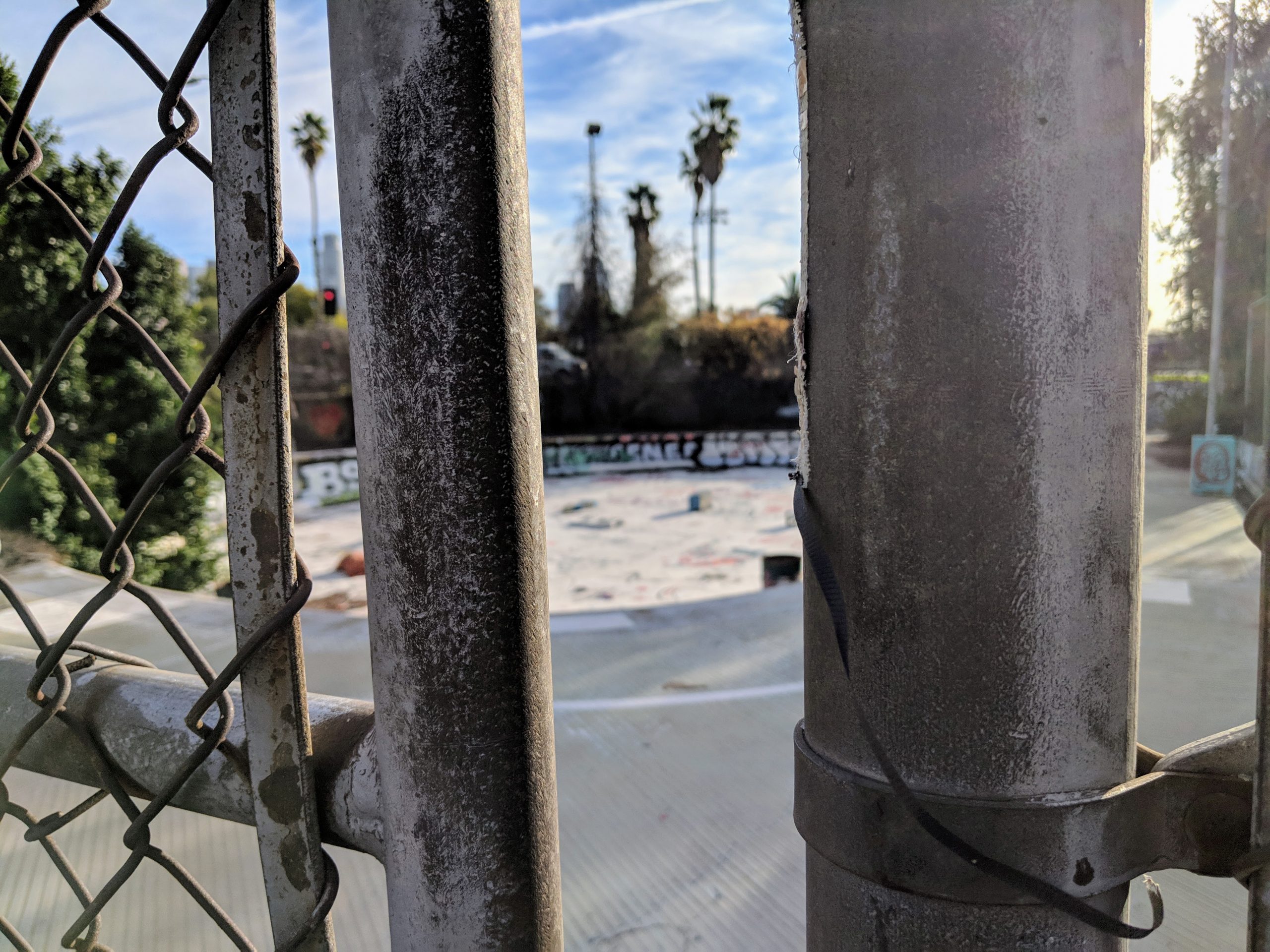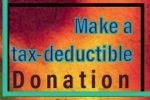
I am in Los Angeles, hiding from winter and rethinking my life. Or maybe I am rethinking winter and hiding from my life. I have been coming back to this city for twenty years, its ugly beauty beckoning. It is a cliché in conversations with displaced New Yorkers – Los Angeles is wonderful, but lonely. I am more scared of being lonely than being a cliché, and so I commit to living in public as much as possible.
#
TRANSPORTATION
My first day here, I borrow a friend’s abandoned bike. It has been chained outside for a year. Dust ekes from the handlebars beneath my grip. I fill the soupy tires to see if they still hold air. They do, the rubber taut. I sail through the afternoon. That night, I meet friends for drinks at the bar we always go to. On the ride back to the room I’ve rented, the left pedal wobbles under the press of my foot and flies off, clattering to the asphalt. I haven’t made it far. I think of turning back, but instead I drop the pedal in the basket and continue on, steering the bike like a scooter along Sunset: one foot stirruped on the remaining pedal, the other pumping in long, slow arcs. I am light-headed with jet lag and booze. I pull the bike up inclines, coast when the sidewalk descends beneath me.
The next day I get a Metrocard, but here they call it “Tap.” My first bus arrives right on schedule. It is calm on board, us few passengers scattered evenly throughout, almost as if we’ve agreed on the number of empty seats that should buffer us from one another. We stare at screens or out windows, the bus rocking across a dip in the road. The next two buses never materialize, or perhaps I am so absorbed in my phone I don’t notice as they roll past. I give up on waiting and walk miles each day. I remind myself I like walking and shouldn’t resent this. Sometimes it pays off. I take an unplanned turn downtown and find myself facing the back of the concert hall, the yawn of its silver scales shimmering against the pinking sky. On an empty stretch of cracked sidewalk, another solo pedestrian approaches and we blink in recognition. We’d met two years prior, when I was in London for a book talk. He is here from Oslo. New York thinks it has the monopoly on serendipity, he tells me. The oceanic wash of cars zipping by as we have the usual exchange of urbanists: gentrification, displacement, the aestheticization of our fields.
Other times, to travel by foot feels cursed. One night, an uncharming walk alongside six lanes of traffic and then, with no warning, the sidewalk dead-ends at a freeway off-ramp. The off-ramp cuts sharply, affording drivers little view of the street waiting to meet them below. I try to calculate the distance across and consider a mad dash. The spilling rush of cars never abates and I’m left with no choice but to circle back a quarter mile to cross at the last traffic signal. I arrive at my friends’ apartment, late. They’ve just started eating. I pile a plate and join them: sweet squash, sharp greens. The off-ramp recedes.
#
LIBRARIES
After a week, I announce (mostly to myself) that I’m ready to be a “real person” and follow a schedule. I will produce! I find the coffee shops cramped and raucous. I’m too distracted, hemmed in on all sides by people who annoy me with how much their conversations remind me of my own. I turn my music up so loud I can’t think. I decide to try the libraries and start with the central library downtown. I ask at the reference desk about the best place to work. I’m directed to the third floor, for the views. The library is built around an interior atrium and I circle it, seeking the promised vantage but I guess it’s just a view of itself. I loop again, this time for somewhere to sit. I find a corner and settle in. Around me, patrons speak in whispers to their companions or less hushed voices to themselves. I cannot get the wifi to connect for more than a few minutes at a time. I wrestle with it as a way to avoid writing.
Now that I’ve come to embrace the view, I like it here. This library, like many, functions as a de facto day shelter. Most homeless shelters force the residents out in the afternoon, barring them until night. I imagine people who have never lived or worked in a shelter don’t know this. Libraries seem to be one of the last remaining places that consider people living without housing to be part of their public.
There are two branch libraries a short walk from where I’m staying, so I try those next. In the first, the lobby greets arrivals with a sign forbidding any individual bag or collection of baggage that exceeds the specified dimensions. I sit down in a large room of empty tables, inert computers at unused work stations. I jab at my laptop keys with a hostile energy, feeling complicit, like a scab crossing a picket line. The following day, I try the other branch. I stop for lunch at a small panaderia. I carry the yellow plastic tray to the cased racks, carefully angling the tongs to select what I think is a guava pastry. The pastry looks kind of sad, shirked and alone on the tray. At the counter, I order two tamales. I want to eat in but I’m too shy to say para aquí in fear it will elicit a response my basically non-existent Spanish won’t comprehend. The tamales are passed to me in a paper bag. Outside the library, I sit at a round concrete table to eat. Across from me, a woman talks quietly into her cellphone. I realize I haven’t seen any payphones. Were there ever payphones here? There must have been. I search my memory and find it: 2002, a payphone near Coronado; it’s morning, I’m on my way to meet a friend; the pleasant ting of the quarter as it drops. I bite into the pastry. Raspberry jam oozes out.
In the entrance of this branch, no bans on personal possessions. I get right to work, happy and even a little smug. But when I go looking for a bathroom, I’m instructed to get a key from the librarian at the front desk. She pulls the key from beneath her counter and also a rough brown roll of paper towels, tearing a jagged sheet and passing it to me. She escorts me and unlocks the door. They were flushing it down the toilet, she says.
#
SEX
On the first day of the new year, I ride with friends to Venice. My stubborn insistence that Angelenos don’t know what cold is cannot shield me from the petulant wind whipping across us. In jackets and hoodies, we huddle together on a sheet, its dips filling with rivulets of sand. In front of us, a couple takes turns shedding clothes and rushing in. We can do this, we decide. We ask a stranger to snap photos as we splash into the frigid shallows. A wave surges across us, a baptismal crash of dark waters.
We go to a Persian restaurant and order generously, our appetites eager and mouthy. Afterward, they drop me at a Korean spa. It is basically a bathhouse. At check-in, I’m not even issued the ill-fitting shorts and t-shirt required for going upstairs to the shared spaces; it’s assumed I’ll be staying downstairs in the men’s section. I strip in the locker room. Sand pours from the pockets of my jeans. I scan my surroundings and with one foot I try to sweep the sand under the locker’s edge. Grit sticks to my bare toes. I shower then sink into one of the hot pools, its bracing heat. A man rises and moves to another, smaller pool. I watch from the corner of my eye, four of them in the tight space, gathered close, hands disappearing beneath the pool’s surface.
I try the steam room but it’s closed for cleaning, its temporary occupants fanning across the other rooms. In the clay sauna, long benches run along two walls. The glass door is frosted, just the transparent edge offering a view to the maintenance worker pushing a cart down the hall. Sweat bubbles at my temples. The air is dry, chalky. Towels fall open. Hands move across laps. The young guy beside me leaves and someone slides to take his place. He checks the door; his face lowers. Others are watching, small sounds slipping from their lips. Being seen like this makes me nervous. But isn’t this what I wanted, a public life? I close my eyes and think of the four in the pool, submerged hands reaching through the jetstreams and eddies for contact, to take something and to give something in return.
END
In writing this piece, I kept returning to Samuel Delany’s Times Square Red, Times Square Blue and Theodore Henderson’s podcast We The Unhoused. Recent reads I can’t stop thinking about: A Separation by Katie Kitamura and everything by Miriam Toews but maybe especially Swing Low, All My Puny Sorrows, and Women Talking. You can find me on twitter @cwillse.

